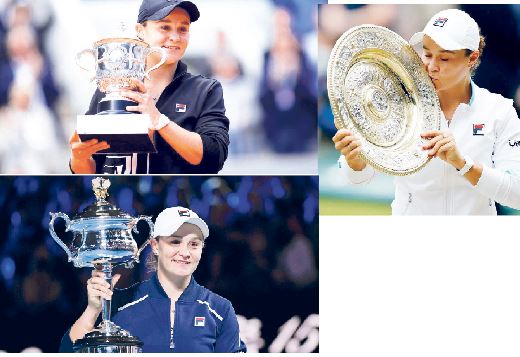Goa is abuzz with excitement as vintage bike and car owners, users, collectors and fans are decking […]

BARTY ENDS THE PARTY CAUSING SHOCK AMONG TENNIS FANS!
Mar 26- Apr 01 2022, SPORTS March 25, 2022Retirement: Ashleigh Barty said that winning Wimbledon in 2021 was the turning point of her career. Many would have thought that the US Open that has eluded her would have been on the cards for the World No 1 come the end of the year.
By GO Correspondent
Over the years we’ve seen athletes retire at the top of their game, pre-maturely when none expected it. The finest example was James Hunt who after winning the 1976 Formula 1 championship with Mclaren retired soon after. In the biographical film “Rush” which is based on the fierce rivalry between James Hunt and Niki Lauda, the ending scene caught my attention. The background is set where rock star bad boy James Hunt after winning the 1976 F1 Championship is on a drunken tour around the world enjoying the success of his lifelong dream. He finds himself at a hangar boarding a flight back to England when he spots the pragmatic Austrian Niki Lauda maintaining his private jet. On being questioned if he plans to get back to pre-season testing Hunt replies that he didn’t just win the biggest prize of his career to get back into the game immediately. “Some of life is meant for pleasure, what’s the point of having a million cups, medals and planes if you don’t have any fun”. “
How is that winning?” My understanding is that different athletes are wired to achieve different objectives. Some are here to dominate even after reaching the pinnacle of sport like the Federers, the Nadals, the Ronaldos and the Messis and some are here to achieve their primary goal of reaching the top and then their goals change like the above-mentioned James Hunt and the below mentioned Ashleigh Barty.
Ashleigh Barty’s decision to retire at just 25 years of age has stunned fans across the world but more importantly, it has been on her terms. There has been an overwhelming pouring of support for the Australian and Women’s World No 1 player. Her retirement is in sharp contrast to her seasoned veterans like Serena Williams, Rafael Nadal and Roger Federer who continue to battle it out on the tennis circuit well into their late 30s.
In a tearful press conference where Barty announced her retirement, she claimed there was a perspective shift in the 2nd phase of her career such that her happiness wasn’t dependent on results. Barty had previously taken an indefinite break from the game in 2014, during which she played cricket professionally for Brisbane Heat in the Women’s Big Bash League. The Queenslander is also a keen golfer but refused to be drawn on whether she might try her hand at the highest level in a third sport.
The three-time grand slam winner, who achieved a childhood dream in winning the All England Championships last year, said tennis would always hold a special place in her heart, but she was looking forward to a life without the stresses of playing on the women’s tour. Ashleigh Barty is also a proud-indigenous-women, part of the Ngarigo aboriginal group. She is the national Indigenous tennis ambassador for Tennis Australia.
After Barty won the Australian Open in January, all the questions were around not whether she would win another grand slam, but how many she would win. That the answer is now and will forever be zero feels incomprehensible. She is a player at her peak literally at the top of the rankings. She has stood there for the best part of three years and remains unchallenged. But then there is that other part of Barty. The person, not the player. She has always acted on her own terms and refuses to be defined by the sport she happens to be extraordinarily good at.
Barty is ambitious, but that ambition has always been tempered with perspective. She knew what she wanted and was content once it was achieved. As she said on Wednesday, that thing was Wimbledon. It was “the one true dream that I wanted in tennis”. Last year, after she did it, something inside her shifted. The Australian Open was unfinished business, so she made that happen too. Then she was spent, physically and mentally, and ready to retire on a high. Athletes across all sports speak about going out on top. Often it entails a requisite number of trophies, awards or other tangible measures of accomplishment.
Barty has that, too – more than most players could ever imagine. Yet she is not a record-chaser. Everything she has said and done suggests that there will never be regrets or what-ifs. That she is not interested in the history books.
She will be a part of them anyway. Because in making this stunning, staggering decision, Barty has reframed the definition of success. She has told all the statisticians that it can be calculated in quality instead of quantity and that the quality does not always have to be experienced in the form of titles. That moment can make careers.
POST-RETIREMENT
Despite the globe-trotting nature of the women’s tour, Barty said she has always been a “homebody” and was looking forward to less travel and more time with her family in Brisbane. “[It is a] new chapter for [fiancee] Garry and I and it’s going to be a lot of fun.” Tennis Australia chief executive, Craig Tiley, said earlier the governing body would acknowledge Barty’s career, but it would wait for the dust to settle on the news before announcing exact plans.
“I think there’ll be many ways to honour Ash and we have to figure out how to do that,” Tiley said. “The legacy she leaves is not only being a great champion on the court, having won three of the grand slams, one of the three players in the world to have been No 1 for three years but being the type of person that everyone loves and I think her legacy will always be one of a gracious and humble champion.”
Barty also expressed admiration for Poland’s Iga Swiatek, the current world No 2, who is likely to replace her at the top of the rankings.“I’m not sure of what the possibilities are [regarding who becomes No 1 following her retirement] – I’ve never been one to look at it much,” Barty said. “I know that if it is Iga, there is no better person. She’s an incredible person, a great tennis player. The way that she’s brought this fresh, fearless energy onto the court has been incredible … She’s a brilliant person, and was one of the first to message me, which is really nice. “I hope that she can take it and still be here, do it her own way, and really chase what she’s after in her career and her dreams.”















